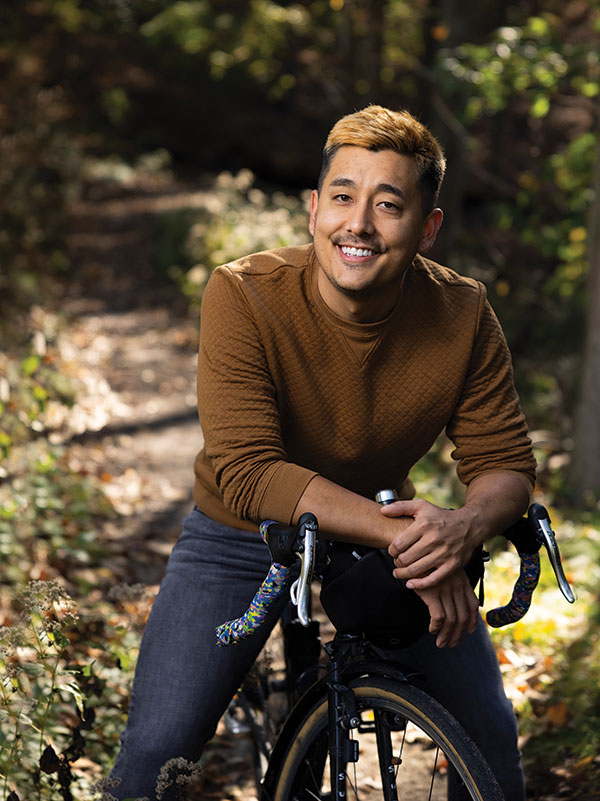
Photo: Joshua Franzos
Taiji Nelson was helping teens connect with nature as an educator at Pittsburgh Parks Conservancy when a partnership with Carnegie Museum of Natural History urged him to become more active in the fight for climate justice. “I had this realization that while I knew the climate crisis was serious, I wasn’t acting like it,” says Nelson. Today, he’s helping to break what he calls the “spiral of silence” around climate change as senior program manager of the museum’s Climate and Rural Systems Partnership (CRSP), a project that engages community members across western Pennsylvania in creating space for open conversations around the climate crisis.
Q: Were you a nature kid?
A: Yes, absolutely. I grew up in Warren, which is a small town in northwestern Pennsylvania in the middle of Allegheny National Forest. I spent a ton of time outdoors with friends and family, unstructured, hanging in the woods, building forts, digging around in streams.
Q: What is CRSP and what drew you to it?
A: CRSP is a network, a place, and a research project. As a network, it’s a group of people who are from different walks of life and approach climate change differently—it may mean something different to their personal or professional lives, but they all have an interest in talking about it. It’s a place to talk to and experiment with people who are also interested in acting on climate change.
We know while most people care about climate change, few talk about it. We help people—educators who work at parks or nature centers or schools, but also artists, scientists, farmers, people in waste management—set aside time to talk about climate change, which our partner at the Mercer County Conservation District calls the “elephant in the room,” and do it in a way that’s relevant to their lives. It’s also a research partnership with the University of Pittsburgh Center for Learning in Out of School Environments that seeks to understand how people benefit from the network. I was drawn to CRSP because it’s collaborative; we’re always looking at climate change in new ways, and with new voices, which is hopeful.
Q: You and the CRSP team are playing the role of connector?
A: Yes, connector and convener. We know science alone is not enough to understand the climate crisis. Along with my colleague Bonnie McGill, we’re fostering some really cool partnerships between science, education, and community. It’s not us telling people what they need to do—there’s not a one-size-fits-all solution for a community or individuals. Everybody’s contribution is going to look a little bit different. If you’re building a network or product with people, they’re more likely to use it, and it will be tailored to their needs.
Q: Is the polarized political climate making this work feel more urgent?
A: Oh, absolutely. For the first time in 2020, climate was a major part of one of the party’s platforms—that’s huge. But it happened at the same time as COVID-19, as the murder of George Floyd and Black Lives Matter protests, as the economic fallout from the pandemic. In rural communities it feels like a powder keg, and it’s a scary and a hard time to talk, but also people are feeling the need to talk, a desire for a place to talk. People recognize that we need to understand our neighbors. That’s hopeful. Talk is action—this is something we say a lot at CRSP. A conversation—not a lecture, not a “you’re wrong”—but a real sharing of information and your experience can change minds.
Q: What’s your personal connection to climate change?
A: I’m really interested in understanding what the future is for outdoor recreation in Pennsylvania. I want to always be able to go out on my bike; I love having the Great Allegheny Passage trail here. So, it’s figuring out, “How do I make sure I have access to it in the future?” And not only just the trail because we know severe storms are washing it out and it’s more expensive to maintain, but also, “How do I make sure I have the time, the health, the money?” Climate change is going to disrupt our social systems, our economic systems, our public health systems.
Q: For a museum installation, you helped identify community groups working toward a positive climate future. What’s a favorite story of yours?
A: Landforce is a nonprofit that employs people who are being excluded from the workforce at a time when we need all hands on deck to solve the climate crisis. They provide jobs, training, and mentorship to individuals who face employment barriers related to the education, economic, and legal systems. Landforce crews build trails, do erosion control, and plant trees to maintain the city’s green infrastructure. The work itself is meaningful, it pays the bills, and it also makes people feel good, with time spent outdoors. We think it’s an interesting model of what a good job can be in the Anthropocene: a job that thinks of workers as whole people, leaves no one behind, and creates space for everyone to contribute.
This material is based upon work supported by the National Science Foundation under Grant No. 1906774. Any opinions, findings and conclusions or recommendations expressed in this material are those of the author(s) and do not necessarily reflect the views of the National Science Foundation.
Receive more stories in your email
Sign upTags:
Facetime Q&A